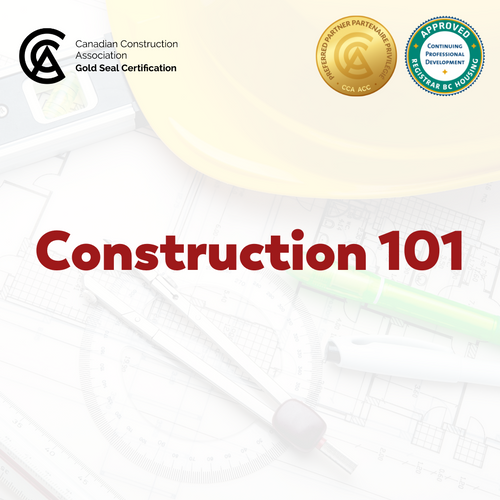Product Overview
In the dynamic world of construction, every project is a symphony of collaboration, where stakeholders from various disciplines come together to transform vision into reality. From the initial spark of an idea to the final flourish of completion, each phase demands unique expertise, coordination, and foresight.
Throughout our workshop, we will explore how different stakeholders, including project owners, architects, contractors, and subcontractors, play pivotal roles in steering projects towards success. By understanding the nuances of their responsibilities at each stage, we can harness the collective power of collaboration to overcome challenges and achieve excellence.
Join us for an immersive workshop designed to explore the intricacies of construction project management, from initiation to close-out. This workshop will delve into the unique roles and responsibilities of stakeholders at each phase of the project, providing valuable insights and practical strategies for success.
What you will learn:
- Introduction to the Industry
- Explore the various sectors within the ICI construction industry.
- Understanding the roles of project stakeholders throughout the construction process.
- Familiarization with the distinct stages of construction, spanning from development to design.
- Project Initiation – The Owner’s Perspective
- Understand the owner’s considerations regarding financial planning.
- Comprehensive understanding of feasibility studies.
- Examine the functional programming process.
- Grasp of fundamental design and engineering principles.
- The Design Process – The Architect’s Role
- Understand the role of the architect through phases of the design process:
- Pre-design
- Schematic design
- Design development
- Establish the content and requirements for construction documents
- Understand the role of the architect through phases of the design process:
- The Tendering Process – Owner & Contractor Perspectives
- Explore construction contracts and Canadian tendering law
- Learn about the competitive tendering process and RFP’s
- Gain insight into the general contractor’s estimating process
- Understand how the owner select the winning tender
- Project Delivery Methods
- Learn about Canadian Construction Document (CCDC) and Canadian Construction Association (CCA) contract delivery types:
- Stipulated price
- Design build
- Construction management
- Public-Private Partnerships (P3)
- Subcontracts
- Learn about Canadian Construction Document (CCDC) and Canadian Construction Association (CCA) contract delivery types:
- Contract Law
- Grasp fundamental concepts of legal agreements commonly utilized in construction projects.
- Explore the key components of contracts.
- Examine real-world contract examples.
- Evaluate standard terms and conditions typically found in contracts.
- Pre-construction Phase
- Gain insight into the distinct roles of the general contractor, architect, owner, and subcontractor in project initiation.
- Explore the organizational structure of the general contractor company, including the development of a construction execution plan and a social responsibility plan.
- Understand the architect's duties regarding the review of agreements, schedules, and meeting organization.
- Learn about the subcontractor's procedures for project initiation, such as subcontract and scope of work reviews, insurance and bond acquisition, and the organization of labor, equipment, and materials.
- Construction Phase
- Gain insights into the general contractor's role during this phase, encompassing all processes necessary for project execution. This includes mobilization, subcontractor management, change and delay management, claims, payment procedures, submittals, project deliverables, meetings, testing and inspection, schedule monitoring, and more.
- Explore the architect's responsibilities as the contract administrator during this phase. This involves managing changes, submittals, general reviews, deficiencies, and other pertinent tasks.
- Discover the owner's involvement in collaborating with the general contractor, including aspects such as payment processing, meeting attendance, management of cash allowances and changes, and other related responsibilities.
- Learn about the subcontractor's activities during mobilization, schedule management, labor and materials coordination, equipment management, payment processes, change management, quality control, addressing deficiencies, and more.
- Post Construction
- Understand the general Contractor's procedures for closing out subcontractors, owners, and internal operations, as well as managing final commissioning and the warranty period.
- Explore how the architect oversees takeover procedures, commissioning, and the warranty period on behalf of the owner.
- Gain insight into the owner's management of staff, furniture, fixtures, and equipment (FFE), final payments, participation in the warranty period, and development of an operational readiness plan.
- Learn about the subcontractor's process for closing out sub-subcontractors and suppliers, reconciling financials with the general contractor, and addressing warranty issues.
Who should attend this workshop:
- Architects and designers: Professionals tasked with designing the building's layout, structure, and aesthetics, ensuring they meet both functional and aesthetic requirements.
- Engineers: Structural, civil, mechanical, and electrical engineers who are involved in the design, planning, and implementation of various aspects of the building's construction.
- Contractors and subcontractors: Individuals and firms responsible for executing the construction work according to the project plans and specifications.
- Owners and developers: Those who own or finance the construction project, including property developers, real estate investors, and building owners.
- Entrepreneurs: Business owners or entrepreneurs exploring opportunities in construction or real estate development and seeking fundamental understanding.
- Administrative staff: Employees working in administrative roles within construction companies, architectural firms, or real estate agencies who would benefit from understanding the overall process.
- Professionals in allied industries: Individuals working in industries related to construction, such as banking, insurance, legal services, or real estate, who want to understand the construction process better to better serve their clients or businesses.
- Government officials: Representatives from governmental bodies involved in urban planning, zoning, or regulatory affairs who need a basic understanding of construction projects.
- Newcomers to Canada: Those new to Canada who want to know more about processes and procedures in the Canadian construction industry.
Through interactive discussions and real-world examples, participants will gain a comprehensive understanding of the construction project lifecycle and the critical roles played by various stakeholders at each stage. Whether you're a project manager, contractor, architect, or owner representative, this workshop will equip you with the knowledge and tools to navigate every phase of the construction journey successfully. Join us and embark on a transformative learning experience that will elevate your building construction knowledge to new heights.
Manual:
Exclusive to this workshop is a comprehensive 390+ page manual that is used as a reference and guide throughout the sessions. The manual is based on the accumulated knowledge and experience gathered over 40 years in the construction industry. It is a valuable and effective tool that will be your construction knowledge go-to.
Industry Credits
- This course is worth 4 gold seal credits.
Course Format
- Live, Online, Instructor-led training. This is a highly interactive course facilitated by the instructor on a video platform.
- You will be expected to have your webcam on during the whole class and participate in break-out rooms, small-group discussions, and other activities with your instructor and classmates during the course.
- Course access information will be provided to you in advance of the training by your instructor
- Full attendance and participation in all sessions is mandatory for course completion. If a student misses a class session, we are unable to transfer registration or provide a partial refund of the registration fees.
Course Requirements (Technology & Participation)
This course requires full face-to-face interaction and participation from both the instructor and students. In order to attend, you’ll must make sure you have the following:
- Computer or laptop with webcam (webcams are mandatory): This course will involve 100% on-screen interaction with your instructor and classmates, reading/viewing on-screen content like slides or videos, and interacting via typing with questions or responses. For this reason, you must have a webcam and use a full computer/laptop, and we do not permit students to attend using a tablet or cell phone.
- A quiet space with minimal distractions: Please plan to be fully engaged in the class, and clear your work schedule just as you would for attendance in an in-class program.
Refunds or Transfers:
- Five (5) or more business days before the course start date: Full refund of registration fees or can be transfers to a different course date.
- Less than five (5) business days before the course start date and course no-shows: No refunds or transfers to future course dates.
- For a complete document on the NRCA Education Policies, click here.
Other Policies
- Substitution of another member of your company/team is permitted up to the course start date for no additional fee.
- Unless otherwise stated, every person able to see, hear, and observe the virtual course sessions must be a paid participant. Non-compliance of this requirement will result in removal from the course. Refunds will not be issued to students who are removed from the course for non-compliance of this requirement.
- If the NRCA has to postpone or cancel courses due to insufficient enrolment, NRCA will refund the registration fee or, if possible, the attendee may choose to move to an identical session in the future.








